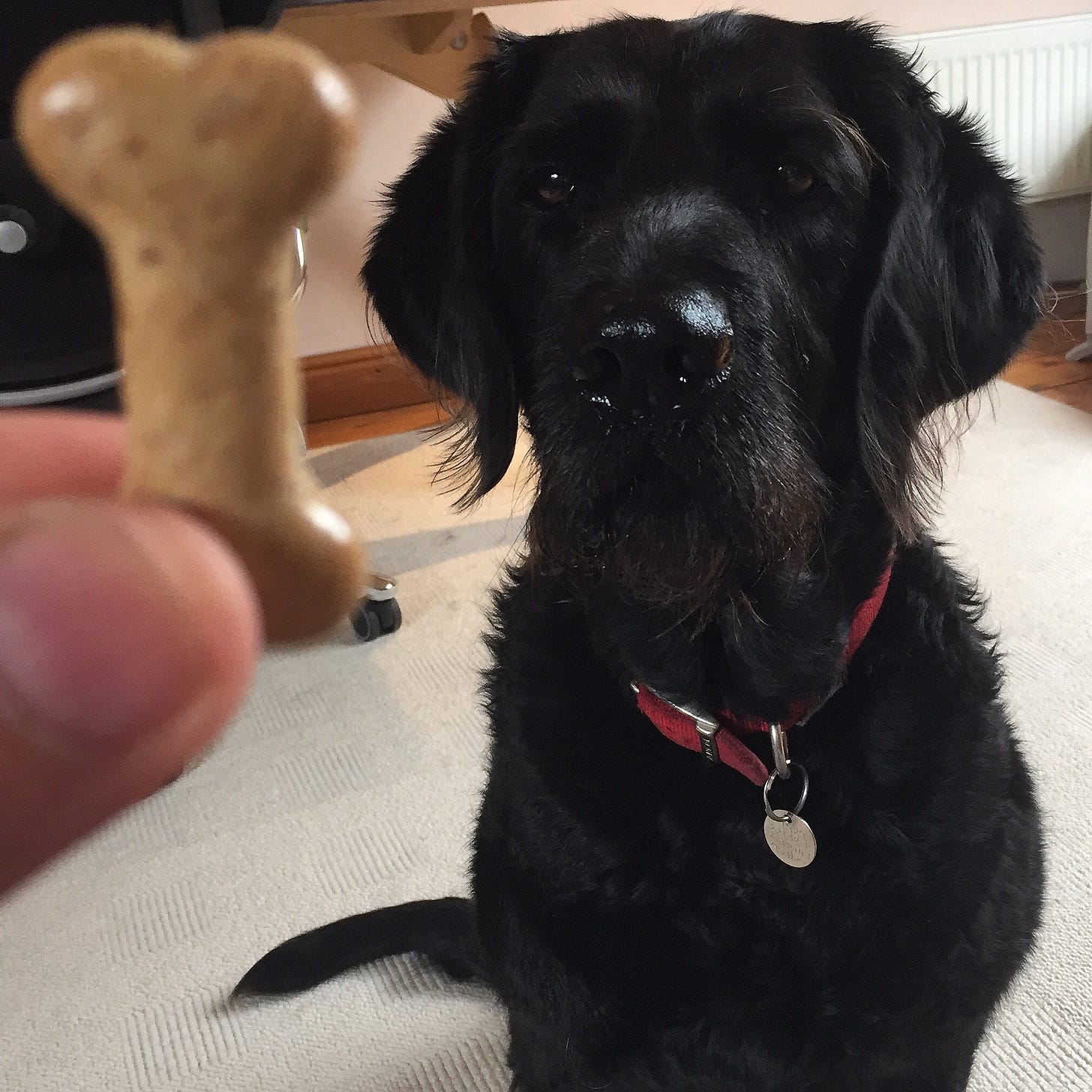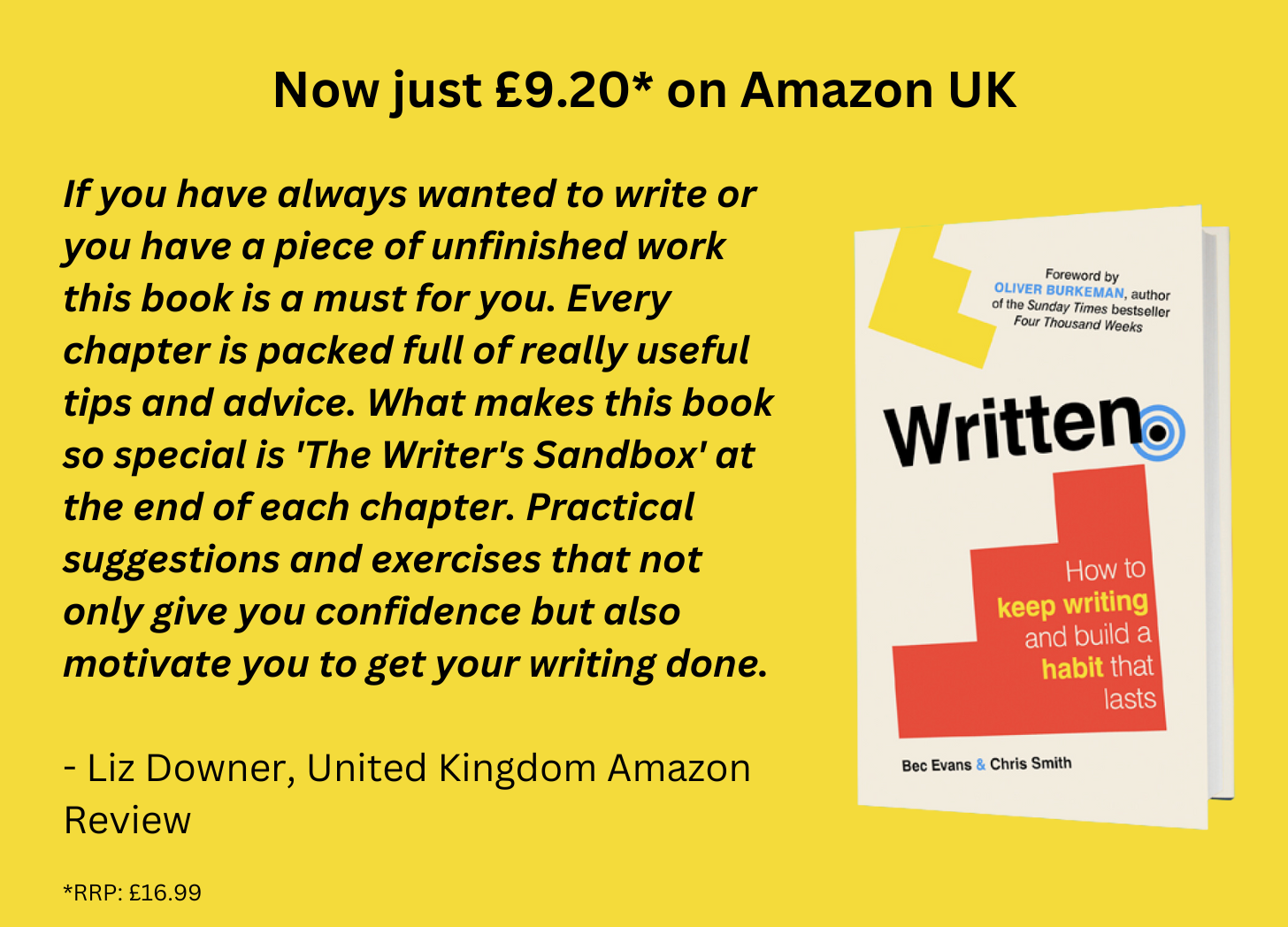Dog biscuits and bite size chunks
What we can all learn from an elderly Labradoodle, taking things small, last call for tonight's webinar & typo mortification.
Our elderly Labradoodle Peggy is poorly and has gone off her food.1 When we offer her something to eat, she turns her head, over-faced by the prospect of a large meal - so we play a game.
Rather than persist with normal-size portions from her bowl, we snap a gravy bone into pieces and offer them to her one by one. We do this using a kind of excited ‘dog voice’ that if you own a pet (or a child) you may be familiar with.2 All this snapping and squealing takes her attention away from her poorly tum. She starts sniffing and leaning her nose forward to get closer to the treat.
Rather than turn away she’s suddenly interested and intrigued by the bite size chunks we’re offering. Soon she’s gobbling down snacks. One gravy bone, then another - after a few she’s ready for bigger treat. Her appetite whetted, she’s able to tackle something more substantial.
Scaling back
If you’ve ever been over-faced by a big challenge you might have taken a similar approach. When you take up a new hobby or skill like learning a language, training for a marathon, organising a party or event, you’ll have started small. But it’s not just new things, often we return to things we’re highly skilled at yet, for one reason or another, struggle to find a way in. As with life (and dogs) so it is with writing.
When we set ourselves a big goal it’s natural to feel overwhelmed. Our brain kicks into primitive fight or flight mode, protecting us from doing hard things.
For many of us, writing is challenging, so if we want to make progress on our projects we need to trick ourselves into doing it by breaking down our large goal (an article, a book) into small starter steps (a word, a sentence, a paragraph). Something so small we can tackle it in one go. We can begin to write from a place of safety and then build up from there, increasing how much we write or for how long.
Psychologist Robert Maurer explains:
“Small easily achievable goals let you tiptoe past your amygdala, keeping it asleep and unable to set off alarm bells. As your small steps continue and the cortex starts working, the brain begins to create software for your desired change, actually laying down new nerve pathways and building new habits.”3
Old dogs, new tricks
Sometimes the writing will come easy - other times, it won’t. When it doesn’t, don’t over-face yourself, learn from the Labradoodle and start small. Break down your big goal into achievable steps and make the writing seem a little more fun (or at least less challenging) than it actually is.
Keep writing 🐶
Bec and Chris
Slumps into sparks
A quick reminder that we’re hosting our first Midpoint Motivator webinar TODAY - we’d love to see you there.
We called them this because we want them to give you a little burst of energy in the middle of the month when you might need your slump turning into a spark.
They’re completely free and we’ll be on hand to answer all your writing questions and offer gentle coaching advice to get you writing and celebrate your progress.
Register to attend below. Send your questions in advance (hit reply or add to the comments below) or join live to ask.
👉 When: Jul 19, 2023 6:00 PM London
👉 Topic: Midpoint Motivator - Ask Us Anything
👉 Register in advance for this webinar
See you there! Have a question but can’t make it live? We’ll send the recording to everyone who registers.
Face palm of the month 🤦🏽
We’re exceptionally embarrassed to have spotted that our welcome email for this newsletter had a typo. In the subject line. No worries, only a few thousand have gone out.
A typo so howling we would have expected you to have unsubscribed the moment you received it. We know we would have done. Thank you for sticking with us and our advice on writing, even if we can’t spell. 🫣
Words of wisdom from Susan Cain
The author of Quiet and Bittersweet, never has typos in her weekly email The Kindred Letters. Last week she offered some advice on overcoming the fear of putting yourself out there. Her advice applies to all areas of life (we particularly love her tip on working at night when we’re less stressed). Take this point:
“Strengthen your backbone and, therefore, your confidence - in small steps. Get in the habit of asking yourself where you stand on various questions. When you have firm opinions or a strong sense of right or wrong on a given question, savor the feeling. It doesn’t matter what kind of question—it can be how to organize the dishwasher.” Susan Cain
Peggy, being half Labrador, is a big eater. Researchers found that many Labs have a genetic mutation which leads to increased food motivated behaviour. Eating and eating a lot is one of her powers; you could say she has been breed for it.
We are fully aware that the excited tones might be more for our benefit than hers, a ritual or superstition, but it works for her and keeps us happy.
Dr Robert Maurer, One Small Step Can Change Your Life: The Kaizen Way.










I’m sorry to hear about Peggy. I did something similar with one of my dogs when he began to go off his food. I’d feed him his kibble out of my hand, one piece at a time. Not being a Lab, he never inhaled his food, though. So anything was good!
Dogs teach us well. Bite-sized chunks is a good lesson.